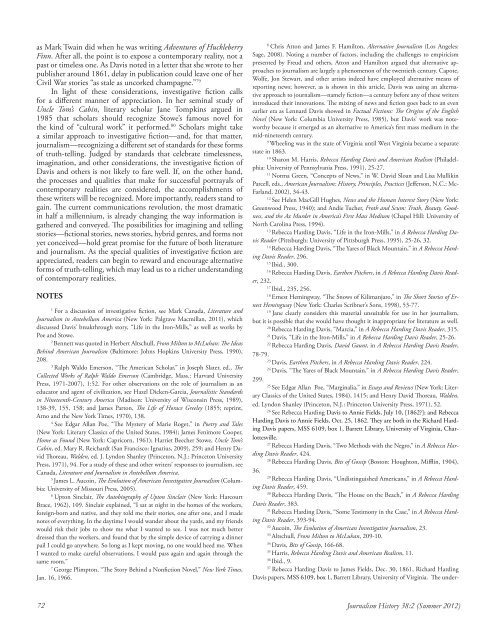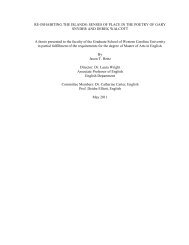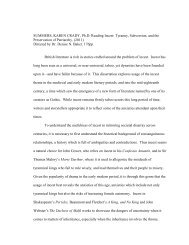Stories of Today: Rebecca Harding Davis' Investigative Fiction
Stories of Today: Rebecca Harding Davis' Investigative Fiction
Stories of Today: Rebecca Harding Davis' Investigative Fiction
You also want an ePaper? Increase the reach of your titles
YUMPU automatically turns print PDFs into web optimized ePapers that Google loves.
as Mark Twain did when he was writing Adventures <strong>of</strong> Huckleberry<br />
Finn. After all, the point is to expose a contemporary reality, not a<br />
past or timeless one. As Davis noted in a letter that she wrote to her<br />
publisher around 1861, delay in publication could leave one <strong>of</strong> her<br />
Civil War stories “as stale as uncorked champagne.” 79<br />
In light <strong>of</strong> these considerations, investigative fiction calls<br />
for a different manner <strong>of</strong> appreciation. In her seminal study <strong>of</strong><br />
Uncle Tom’s Cabin, literary scholar Jane Tompkins argued in<br />
1985 that scholars should recognize Stowe’s famous novel for<br />
the kind <strong>of</strong> “cultural work” it performed. 80 Scholars might take<br />
a similar approach to investigative fiction—and, for that matter,<br />
journalism—recognizing a different set <strong>of</strong> standards for these forms<br />
<strong>of</strong> truth-telling. Judged by standards that celebrate timelessness,<br />
imagination, and other considerations, the investigative fiction <strong>of</strong><br />
Davis and others is not likely to fare well. If, on the other hand,<br />
the processes and qualities that make for successful portrayals <strong>of</strong><br />
contemporary realities are considered, the accomplishments <strong>of</strong><br />
these writers will be recognized. More importantly, readers stand to<br />
gain. The current communications revolution, the most dramatic<br />
in half a millennium, is already changing the way information is<br />
gathered and conveyed. The possibilities for imagining and telling<br />
stories—fictional stories, news stories, hybrid genres, and forms not<br />
yet conceived—hold great promise for the future <strong>of</strong> both literature<br />
and journalism. As the special qualities <strong>of</strong> investigative fiction are<br />
appreciated, readers can begin to reward and encourage alternative<br />
forms <strong>of</strong> truth-telling, which may lead us to a richer understanding<br />
<strong>of</strong> contemporary realities.<br />
NOTES<br />
1<br />
For a discussion <strong>of</strong> investigative fiction, see Mark Canada, Literature and<br />
Journalism in Antebellum America (New York: Palgrave Macmillan, 2011), which<br />
discussed Davis’ breakthrough story, “Life in the Iron-Mills,” as well as works by<br />
Poe and Stowe.<br />
2<br />
Bennett was quoted in Herbert Altschull, From Milton to McLuhan: The Ideas<br />
Behind American Journalism (Baltimore: Johns Hopkins University Press, 1990),<br />
208.<br />
3<br />
Ralph Waldo Emerson, “The American Scholar,” in Joseph Slater, ed., The<br />
Collected Works <strong>of</strong> Ralph Waldo Emerson (Cambridge, Mass.: Harvard University<br />
Press, 1971-2007), 1:52. For other observations on the role <strong>of</strong> journalism as an<br />
educator and agent <strong>of</strong> civilization, see Hazel Dicken-Garcia, Journalistic Standards<br />
in Nineteenth-Century America (Madison: University <strong>of</strong> Wisconsin Press, 1989),<br />
138-39, 155, 158; and James Parton, The Life <strong>of</strong> Horace Greeley (1855; reprint,<br />
Arno and the New York Times, 1970), 138.<br />
4<br />
See Edgar Allan Poe, “The Mystery <strong>of</strong> Marie Roget,” in Poetry and Tales<br />
(New York: Literary Classics <strong>of</strong> the United States, 1984); James Fenimore Cooper,<br />
Home as Found (New York: Capricorn, 1961); Harriet Beecher Stowe, Uncle Tom’s<br />
Cabin, ed. Mary R. Reichardt (San Francisco: Ignatius, 2009), 259; and Henry David<br />
Thoreau, Walden, ed. J. Lyndon Shanley (Princeton, N.J.: Princeton University<br />
Press, 1971), 94. For a study <strong>of</strong> these and other writers’ responses to journalism, see<br />
Canada, Literature and Journalism in Antebellum America.<br />
5<br />
James L. Aucoin, The Evolution <strong>of</strong> American <strong>Investigative</strong> Journalism (Columbia:<br />
University <strong>of</strong> Missouri Press, 2005).<br />
6<br />
Upton Sinclair, The Autobiography <strong>of</strong> Upton Sinclair (New York: Harcourt<br />
Brace, 1962), 109. Sinclair explained, “I sat at night in the homes <strong>of</strong> the workers,<br />
foreign-born and native, and they told me their stories, one after one, and I made<br />
notes <strong>of</strong> everything. In the daytime I would wander about the yards, and my friends<br />
would risk their jobs to show me what I wanted to see. I was not much better<br />
dressed than the workers, and found that by the simple device <strong>of</strong> carrying a dinner<br />
pail I could go anywhere. So long as I kept moving, no one would heed me. When<br />
I wanted to make careful observations, I would pass again and again through the<br />
same room.”<br />
7<br />
George Plimpton, “The Story Behind a Nonfiction Novel,” New York Times,<br />
Jan. 16, 1966.<br />
8<br />
Chris Atton and James F. Hamilton, Alternative Journalism (Los Angeles:<br />
Sage, 2008). Noting a number <strong>of</strong> factors, including the challenges to empiricism<br />
presented by Freud and others, Atton and Hamilton argued that alternative approaches<br />
to journalism are largely a phenomenon <strong>of</strong> the twentieth century. Capote,<br />
Wolfe, Jon Stewart, and other artists indeed have employed alternative means <strong>of</strong><br />
reporting news; however, as is shown in this article, Davis was using an alternative<br />
approach to journalism—namely fiction—a century before any <strong>of</strong> these writers<br />
introduced their innovations. The mixing <strong>of</strong> news and fiction goes back to an even<br />
earlier era as Lennard Davis showed in Factual <strong>Fiction</strong>s: The Origins <strong>of</strong> the English<br />
Novel (New York: Columbia University Press, 1985), but Davis’ work was noteworthy<br />
because it emerged as an alternative to America’s first mass medium in the<br />
mid-nineteenth century.<br />
9<br />
Wheeling was in the state <strong>of</strong> Virginia until West Virginia became a separate<br />
state in 1863.<br />
10<br />
Sharon M. Harris, <strong>Rebecca</strong> <strong>Harding</strong> Davis and American Realism (Philadelphia:<br />
University <strong>of</strong> Pennsylvania Press, 1991), 25-27.<br />
11<br />
Norma Green, “Concepts <strong>of</strong> News,” in W. David Sloan and Lisa Mullikin<br />
Parcell, eds., American Journalism: History, Principles, Practices (Jefferson, N.C.: Mc-<br />
Farland, 2002), 34-43.<br />
12<br />
See Helen MacGill Hughes, News and the Human Interest Story (New York:<br />
Greenwood Press, 1940); and Andie Tucher, Froth and Scum: Truth, Beauty, Goodness,<br />
and the Ax Murder in America’s First Mass Medium (Chapel Hill: University <strong>of</strong><br />
North Carolina Press, 1994).<br />
13<br />
<strong>Rebecca</strong> <strong>Harding</strong> Davis, “Life in the Iron-Mills,” in A <strong>Rebecca</strong> <strong>Harding</strong> Davis<br />
Reader (Pittsburgh: University <strong>of</strong> Pittsburgh Press, 1995), 25-26, 32.<br />
14<br />
<strong>Rebecca</strong> <strong>Harding</strong> Davis, “The Yares <strong>of</strong> Black Mountain,” in A <strong>Rebecca</strong> <strong>Harding</strong><br />
Davis Reader, 296.<br />
15<br />
Ibid., 300.<br />
16<br />
<strong>Rebecca</strong> <strong>Harding</strong> Davis, Earthen Pitchers, in A <strong>Rebecca</strong> <strong>Harding</strong> Davis Reader,<br />
232.<br />
17<br />
Ibid., 235, 256.<br />
18<br />
Ernest Hemingway, “The Snows <strong>of</strong> Kilimanjaro,” in The Short <strong>Stories</strong> <strong>of</strong> Ernest<br />
Hemingway (New York: Charles Scribner’s Sons, 1998), 53-77.<br />
19<br />
Jane clearly considers this material unsuitable for use in her journalism,<br />
but it is possible that she would have thought it inappropriate for literature as well.<br />
20<br />
<strong>Rebecca</strong> <strong>Harding</strong> Davis, “Marcia,” in A <strong>Rebecca</strong> <strong>Harding</strong> Davis Reader, 315.<br />
21<br />
Davis, “Life in the Iron-Mills,” in A <strong>Rebecca</strong> <strong>Harding</strong> Davis Reader, 25-26.<br />
22<br />
<strong>Rebecca</strong> <strong>Harding</strong> Davis, David Gaunt, in A <strong>Rebecca</strong> <strong>Harding</strong> Davis Reader,<br />
78-79.<br />
23<br />
Davis, Earthen Pitchers, in A <strong>Rebecca</strong> <strong>Harding</strong> Davis Reader, 224.<br />
24<br />
Davis, “The Yares <strong>of</strong> Black Mountain,” in A <strong>Rebecca</strong> <strong>Harding</strong> Davis Reader,<br />
299.<br />
25<br />
See Edgar Allan Poe, “Marginalia,” in Essays and Reviews (New York: Literary<br />
Classics <strong>of</strong> the United States, 1984), 1415; and Henry David Thoreau, Walden,<br />
ed. Lyndon Shanley (Princeton, N.J.: Princeton University Press, 1971), 52.<br />
26<br />
See <strong>Rebecca</strong> <strong>Harding</strong> Davis to Annie Fields, July 10, [1862?]; and <strong>Rebecca</strong><br />
<strong>Harding</strong> Davis to Annie Fields, Oct. 25, 1862. They are both in the Richard <strong>Harding</strong><br />
Davis papers, MSS 6109, box 1, Barrett Library, University <strong>of</strong> Virginia, Charlottesville.<br />
27<br />
<strong>Rebecca</strong> <strong>Harding</strong> Davis, “Two Methods with the Negro,” in A <strong>Rebecca</strong> <strong>Harding</strong><br />
Davis Reader, 424.<br />
28<br />
<strong>Rebecca</strong> <strong>Harding</strong> Davis, Bits <strong>of</strong> Gossip (Boston: Houghton, Mifflin, 1904),<br />
36.<br />
29<br />
<strong>Rebecca</strong> <strong>Harding</strong> Davis, “Undistinguished Americans,” in A <strong>Rebecca</strong> <strong>Harding</strong><br />
Davis Reader, 459.<br />
30<br />
<strong>Rebecca</strong> <strong>Harding</strong> Davis, “The House on the Beach,” in A <strong>Rebecca</strong> <strong>Harding</strong><br />
Davis Reader, 383.<br />
31<br />
<strong>Rebecca</strong> <strong>Harding</strong> Davis, “Some Testimony in the Case,” in A <strong>Rebecca</strong> <strong>Harding</strong><br />
Davis Reader, 393-94.<br />
32<br />
Aucoin, The Evolution <strong>of</strong> American <strong>Investigative</strong> Journalism, 23.<br />
33<br />
Altschull, From Milton to McLuhan, 209-10.<br />
34<br />
Davis, Bits <strong>of</strong> Gossip, 166-68.<br />
35<br />
Harris, <strong>Rebecca</strong> <strong>Harding</strong> Davis and American Realism, 11.<br />
36<br />
Ibid., 9.<br />
37<br />
<strong>Rebecca</strong> <strong>Harding</strong> Davis to James Fields, Dec. 30, 1861, Richard <strong>Harding</strong><br />
Davis papers, MSS 6109, box 1, Barrett Library, University <strong>of</strong> Virginia. The under-<br />
72<br />
Journalism History 38:2 (Summer 2012)
















